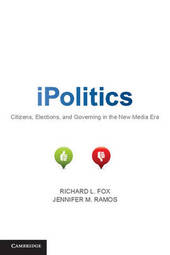
|
iPolitics: Citizens, Elections, and Governing in the New Media Era
Paperback / softback
Main Details
| Title |
iPolitics: Citizens, Elections, and Governing in the New Media Era
|
| Authors and Contributors |
Edited by Richard L. Fox
|
|
Edited by Jennifer M. Ramos
|
| Physical Properties |
| Format:Paperback / softback | | Pages:322 | | Dimensions(mm): Height 229,Width 152 |
|
| ISBN/Barcode |
9781107667655
|
| Classifications | Dewey:306.2 |
|---|
| Audience | | Postgraduate, Research & Scholarly | |
|---|
| Illustrations |
28 Tables, unspecified; 22 Line drawings, unspecified
|
|
Publishing Details |
| Publisher |
Cambridge University Press
|
| Imprint |
Cambridge University Press
|
| Publication Date |
28 November 2011 |
| Publication Country |
United Kingdom
|
Description
Politicians rely on Twitter, Facebook and YouTube to exercise political power. Citizens around the world also use these tools to vent political frustrations, join political groups and organize revolutions. Political activists blog to promote candidates, solicit and coordinate financial contributions and provide opportunities for volunteers. iPolitics describes the ways in which new media innovations change how politicians and citizens engage the political arena. Among other things, contributors to this volume analyze whether the public's political knowledge has increased or decreased in the new media era, the role television still plays in the information universe, the effect bloggers have had on the debate and outcome of healthcare reform, and the manner in which political leaders should navigate the new media environment. While the majority of contributors examine new media and politics in the United States, the volume also provides a unique comparative perspective on this relationship using cases from abroad.
Author Biography
Richard L. Fox is an Associate Professor of Political Science at Loyola Marymount University. He is the co-author of It Still Takes a Candidate: Why Women Don't Run for Office (Cambridge, 2010) and Tabloid Justice: The Criminal System in the Age of Media Frenzy, 2nd edition (2007), as well as co-editor of Gender and Election, 2nd edition (Cambridge, 2009). Jennifer M. Ramos is an Associate Professor of Political Science at Loyola Marymount University. Her research focuses on understanding the causes and consequences of political change, with an emphasis on the role of ideas, norms and identity. Her work has appeared in the Journal of Politics, Public Opinion Quarterly, International Studies Perspectives, the Journal of Political Ideologies and Human Rights Review.
Reviews'A lively collection of essays exploring digital media and politics in the United States as well as comparatively. iPolitics covers a wide range of crucial topics, from political knowledge and participation to governance and campaigning. This book demonstrates persuasively that the implications of digital media are often complex, nuanced, and contingent.' Bruce Bimber, University of California, Santa Barbara 'For most anything worth knowing in today's world, it seems like there's an app for that. But, alas, there's no simple download for the latest research on the political consequences of the twenty-first-century media environment. Fortunately, Richard L. Fox and Jennifer M. Ramos have put together a volume that sheds new light on how the rise of Facebook, Twitter, YouTube, and a dizzying array of Internet sites and cable outlets has influenced citizens' access to political information, the way politicians communicate with their constituents, and the broader relationship between the government and the governed. This insightful collection of essays shows that in the United States and beyond, the rise of new media has had significant, profound effects on politics - but not always those that observers have anticipated.' Danny Hayes, American University 'iPolitics is an excellent compilation of the multiple ways new media and the Internet are changing journalism, campaigning, and democratic governance. The collection is a fantastic snapshot of the fast-evolving influence of new media on our political world.' Rolfe Daus Peterson, Mercyhurst College
|